Healthcare Ethics Report: Analysis of a Medication Error Case Study
VerifiedAdded on 2022/10/03
|9
|2225
|17
Report
AI Summary
This report presents a comprehensive analysis of a healthcare case study involving a seven-month-old baby, Ruth, who suffered from a severe heart condition and experienced a medication error. The assignment delves into the ethical and legal implications of the nurse administering an adult dose of morphine, highlighting violations of medication safety standards and the doctor's failure to disclose the incident to the parents. The report explores ethical concepts such as autonomy, justice, beneficence, and non-maleficence, evaluating how these principles were applied (or disregarded) in the case. It also examines the ethical dilemmas, including the nurse's actions and the doctor's cover-up, and discusses the importance of ethical awareness, self-reflection, and the application of reflective frameworks like Driscoll's. Furthermore, the report emphasizes the significance of ethical practices in nursing, the need for transparency, and the implementation of new policies to prevent future medication errors, ultimately contributing to improved patient safety and ethical conduct within the healthcare system.
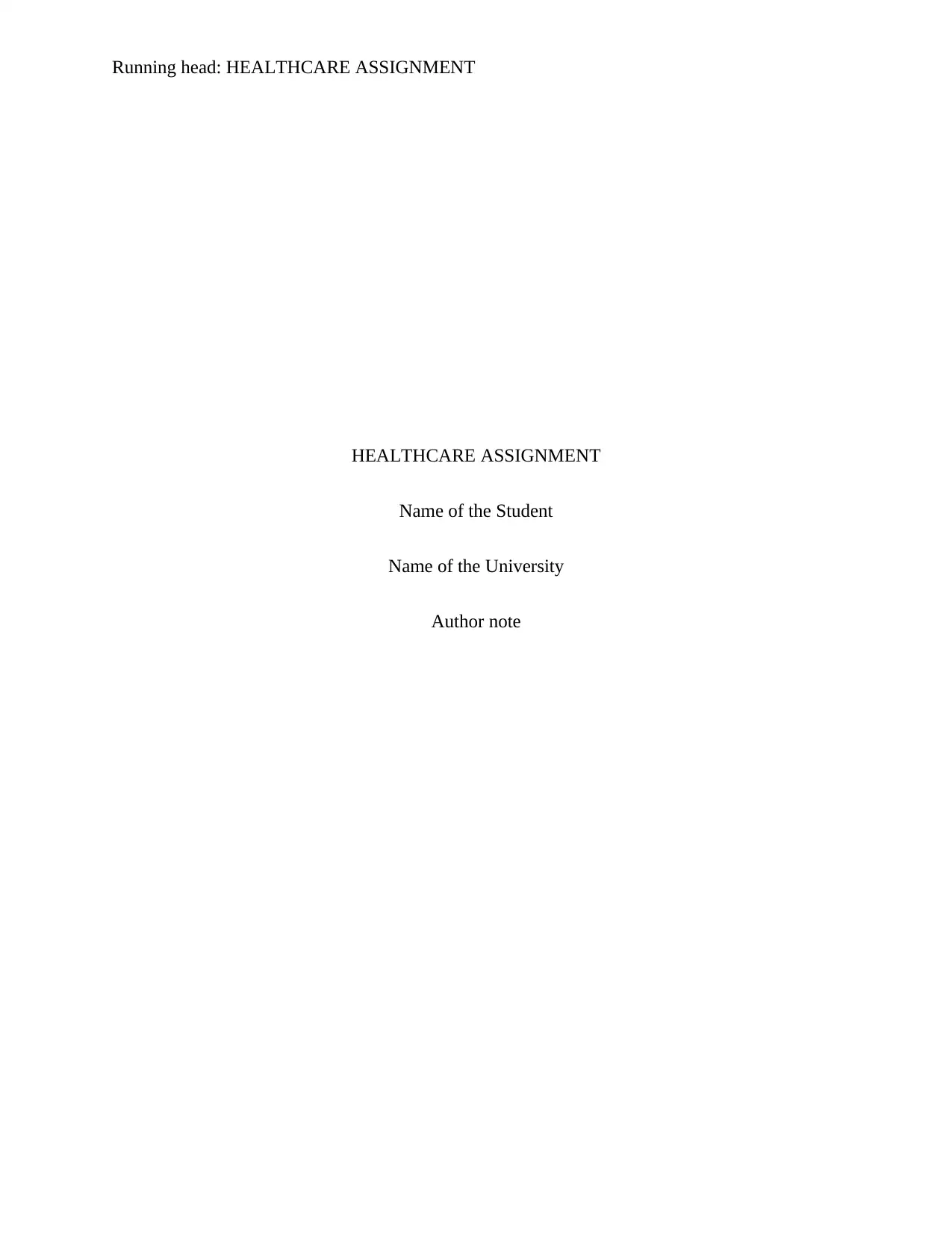
Running head: HEALTHCARE ASSIGNMENT
HEALTHCARE ASSIGNMENT
Name of the Student
Name of the University
Author note
HEALTHCARE ASSIGNMENT
Name of the Student
Name of the University
Author note
Paraphrase This Document
Need a fresh take? Get an instant paraphrase of this document with our AI Paraphraser
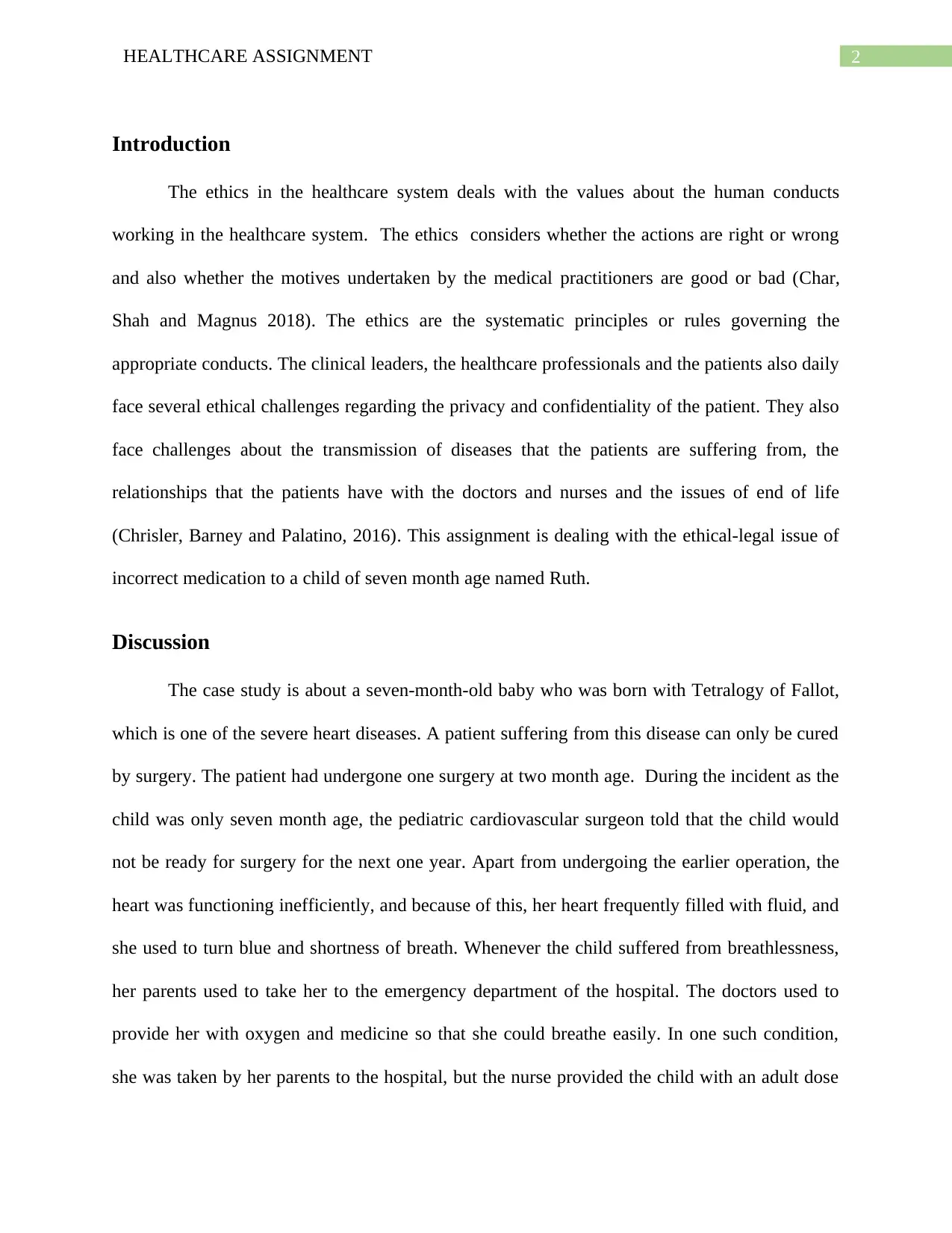
2HEALTHCARE ASSIGNMENT
Introduction
The ethics in the healthcare system deals with the values about the human conducts
working in the healthcare system. The ethics considers whether the actions are right or wrong
and also whether the motives undertaken by the medical practitioners are good or bad (Char,
Shah and Magnus 2018). The ethics are the systematic principles or rules governing the
appropriate conducts. The clinical leaders, the healthcare professionals and the patients also daily
face several ethical challenges regarding the privacy and confidentiality of the patient. They also
face challenges about the transmission of diseases that the patients are suffering from, the
relationships that the patients have with the doctors and nurses and the issues of end of life
(Chrisler, Barney and Palatino, 2016). This assignment is dealing with the ethical-legal issue of
incorrect medication to a child of seven month age named Ruth.
Discussion
The case study is about a seven-month-old baby who was born with Tetralogy of Fallot,
which is one of the severe heart diseases. A patient suffering from this disease can only be cured
by surgery. The patient had undergone one surgery at two month age. During the incident as the
child was only seven month age, the pediatric cardiovascular surgeon told that the child would
not be ready for surgery for the next one year. Apart from undergoing the earlier operation, the
heart was functioning inefficiently, and because of this, her heart frequently filled with fluid, and
she used to turn blue and shortness of breath. Whenever the child suffered from breathlessness,
her parents used to take her to the emergency department of the hospital. The doctors used to
provide her with oxygen and medicine so that she could breathe easily. In one such condition,
she was taken by her parents to the hospital, but the nurse provided the child with an adult dose
Introduction
The ethics in the healthcare system deals with the values about the human conducts
working in the healthcare system. The ethics considers whether the actions are right or wrong
and also whether the motives undertaken by the medical practitioners are good or bad (Char,
Shah and Magnus 2018). The ethics are the systematic principles or rules governing the
appropriate conducts. The clinical leaders, the healthcare professionals and the patients also daily
face several ethical challenges regarding the privacy and confidentiality of the patient. They also
face challenges about the transmission of diseases that the patients are suffering from, the
relationships that the patients have with the doctors and nurses and the issues of end of life
(Chrisler, Barney and Palatino, 2016). This assignment is dealing with the ethical-legal issue of
incorrect medication to a child of seven month age named Ruth.
Discussion
The case study is about a seven-month-old baby who was born with Tetralogy of Fallot,
which is one of the severe heart diseases. A patient suffering from this disease can only be cured
by surgery. The patient had undergone one surgery at two month age. During the incident as the
child was only seven month age, the pediatric cardiovascular surgeon told that the child would
not be ready for surgery for the next one year. Apart from undergoing the earlier operation, the
heart was functioning inefficiently, and because of this, her heart frequently filled with fluid, and
she used to turn blue and shortness of breath. Whenever the child suffered from breathlessness,
her parents used to take her to the emergency department of the hospital. The doctors used to
provide her with oxygen and medicine so that she could breathe easily. In one such condition,
she was taken by her parents to the hospital, but the nurse provided the child with an adult dose
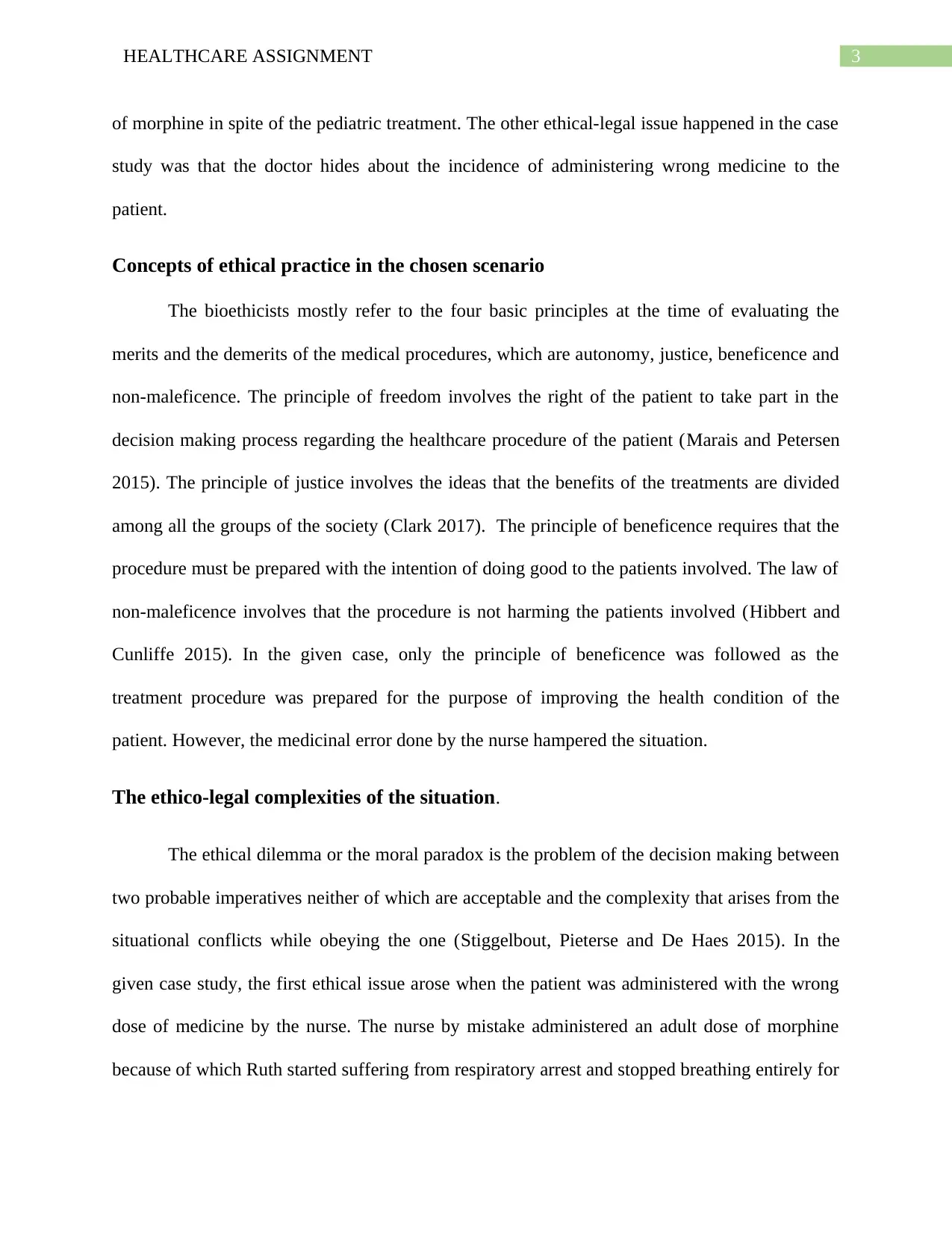
3HEALTHCARE ASSIGNMENT
of morphine in spite of the pediatric treatment. The other ethical-legal issue happened in the case
study was that the doctor hides about the incidence of administering wrong medicine to the
patient.
Concepts of ethical practice in the chosen scenario
The bioethicists mostly refer to the four basic principles at the time of evaluating the
merits and the demerits of the medical procedures, which are autonomy, justice, beneficence and
non-maleficence. The principle of freedom involves the right of the patient to take part in the
decision making process regarding the healthcare procedure of the patient (Marais and Petersen
2015). The principle of justice involves the ideas that the benefits of the treatments are divided
among all the groups of the society (Clark 2017). The principle of beneficence requires that the
procedure must be prepared with the intention of doing good to the patients involved. The law of
non-maleficence involves that the procedure is not harming the patients involved (Hibbert and
Cunliffe 2015). In the given case, only the principle of beneficence was followed as the
treatment procedure was prepared for the purpose of improving the health condition of the
patient. However, the medicinal error done by the nurse hampered the situation.
The ethico-legal complexities of the situation.
The ethical dilemma or the moral paradox is the problem of the decision making between
two probable imperatives neither of which are acceptable and the complexity that arises from the
situational conflicts while obeying the one (Stiggelbout, Pieterse and De Haes 2015). In the
given case study, the first ethical issue arose when the patient was administered with the wrong
dose of medicine by the nurse. The nurse by mistake administered an adult dose of morphine
because of which Ruth started suffering from respiratory arrest and stopped breathing entirely for
of morphine in spite of the pediatric treatment. The other ethical-legal issue happened in the case
study was that the doctor hides about the incidence of administering wrong medicine to the
patient.
Concepts of ethical practice in the chosen scenario
The bioethicists mostly refer to the four basic principles at the time of evaluating the
merits and the demerits of the medical procedures, which are autonomy, justice, beneficence and
non-maleficence. The principle of freedom involves the right of the patient to take part in the
decision making process regarding the healthcare procedure of the patient (Marais and Petersen
2015). The principle of justice involves the ideas that the benefits of the treatments are divided
among all the groups of the society (Clark 2017). The principle of beneficence requires that the
procedure must be prepared with the intention of doing good to the patients involved. The law of
non-maleficence involves that the procedure is not harming the patients involved (Hibbert and
Cunliffe 2015). In the given case, only the principle of beneficence was followed as the
treatment procedure was prepared for the purpose of improving the health condition of the
patient. However, the medicinal error done by the nurse hampered the situation.
The ethico-legal complexities of the situation.
The ethical dilemma or the moral paradox is the problem of the decision making between
two probable imperatives neither of which are acceptable and the complexity that arises from the
situational conflicts while obeying the one (Stiggelbout, Pieterse and De Haes 2015). In the
given case study, the first ethical issue arose when the patient was administered with the wrong
dose of medicine by the nurse. The nurse by mistake administered an adult dose of morphine
because of which Ruth started suffering from respiratory arrest and stopped breathing entirely for
⊘ This is a preview!⊘
Do you want full access?
Subscribe today to unlock all pages.

Trusted by 1+ million students worldwide
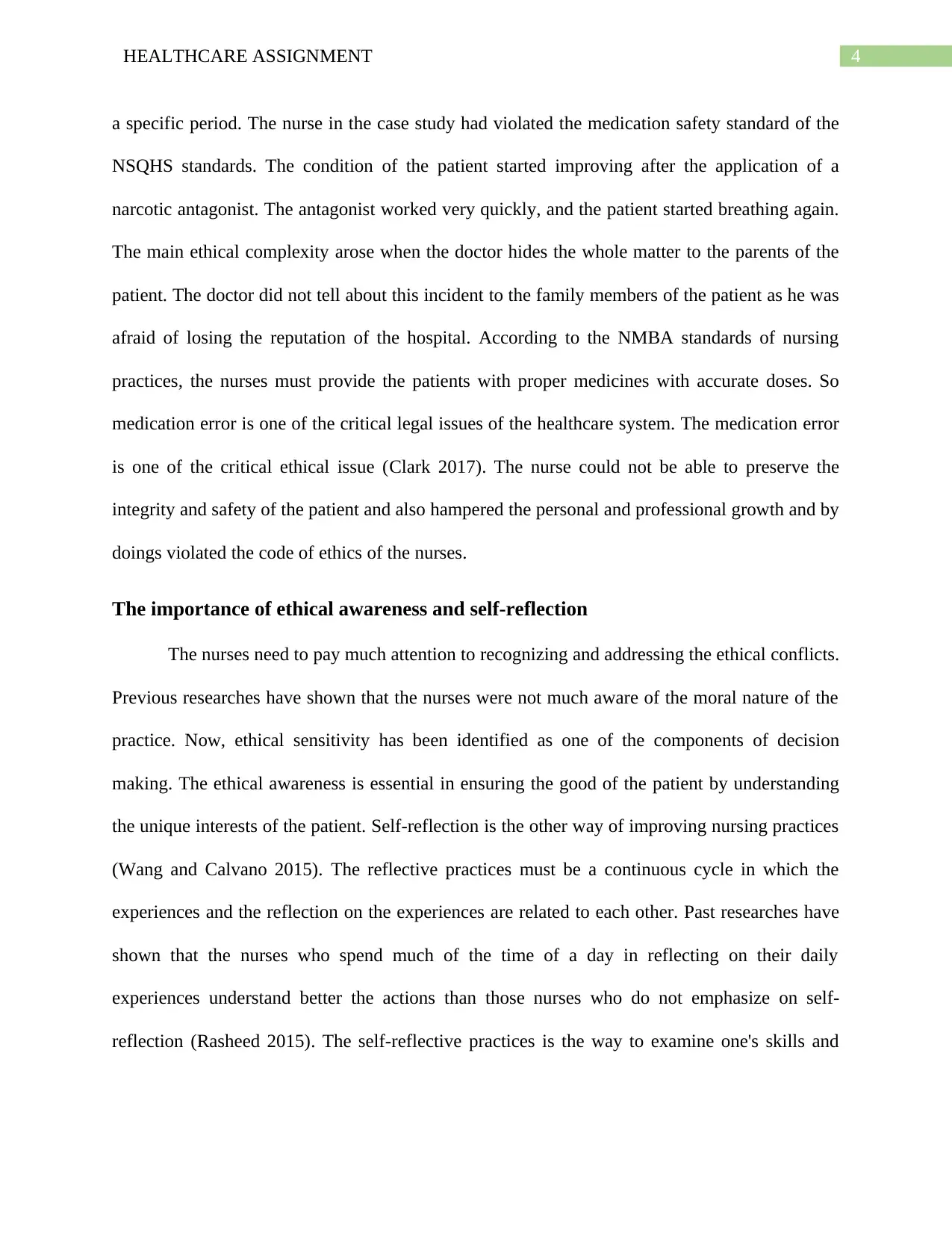
4HEALTHCARE ASSIGNMENT
a specific period. The nurse in the case study had violated the medication safety standard of the
NSQHS standards. The condition of the patient started improving after the application of a
narcotic antagonist. The antagonist worked very quickly, and the patient started breathing again.
The main ethical complexity arose when the doctor hides the whole matter to the parents of the
patient. The doctor did not tell about this incident to the family members of the patient as he was
afraid of losing the reputation of the hospital. According to the NMBA standards of nursing
practices, the nurses must provide the patients with proper medicines with accurate doses. So
medication error is one of the critical legal issues of the healthcare system. The medication error
is one of the critical ethical issue (Clark 2017). The nurse could not be able to preserve the
integrity and safety of the patient and also hampered the personal and professional growth and by
doings violated the code of ethics of the nurses.
The importance of ethical awareness and self-reflection
The nurses need to pay much attention to recognizing and addressing the ethical conflicts.
Previous researches have shown that the nurses were not much aware of the moral nature of the
practice. Now, ethical sensitivity has been identified as one of the components of decision
making. The ethical awareness is essential in ensuring the good of the patient by understanding
the unique interests of the patient. Self-reflection is the other way of improving nursing practices
(Wang and Calvano 2015). The reflective practices must be a continuous cycle in which the
experiences and the reflection on the experiences are related to each other. Past researches have
shown that the nurses who spend much of the time of a day in reflecting on their daily
experiences understand better the actions than those nurses who do not emphasize on self-
reflection (Rasheed 2015). The self-reflective practices is the way to examine one's skills and
a specific period. The nurse in the case study had violated the medication safety standard of the
NSQHS standards. The condition of the patient started improving after the application of a
narcotic antagonist. The antagonist worked very quickly, and the patient started breathing again.
The main ethical complexity arose when the doctor hides the whole matter to the parents of the
patient. The doctor did not tell about this incident to the family members of the patient as he was
afraid of losing the reputation of the hospital. According to the NMBA standards of nursing
practices, the nurses must provide the patients with proper medicines with accurate doses. So
medication error is one of the critical legal issues of the healthcare system. The medication error
is one of the critical ethical issue (Clark 2017). The nurse could not be able to preserve the
integrity and safety of the patient and also hampered the personal and professional growth and by
doings violated the code of ethics of the nurses.
The importance of ethical awareness and self-reflection
The nurses need to pay much attention to recognizing and addressing the ethical conflicts.
Previous researches have shown that the nurses were not much aware of the moral nature of the
practice. Now, ethical sensitivity has been identified as one of the components of decision
making. The ethical awareness is essential in ensuring the good of the patient by understanding
the unique interests of the patient. Self-reflection is the other way of improving nursing practices
(Wang and Calvano 2015). The reflective practices must be a continuous cycle in which the
experiences and the reflection on the experiences are related to each other. Past researches have
shown that the nurses who spend much of the time of a day in reflecting on their daily
experiences understand better the actions than those nurses who do not emphasize on self-
reflection (Rasheed 2015). The self-reflective practices is the way to examine one's skills and
Paraphrase This Document
Need a fresh take? Get an instant paraphrase of this document with our AI Paraphraser
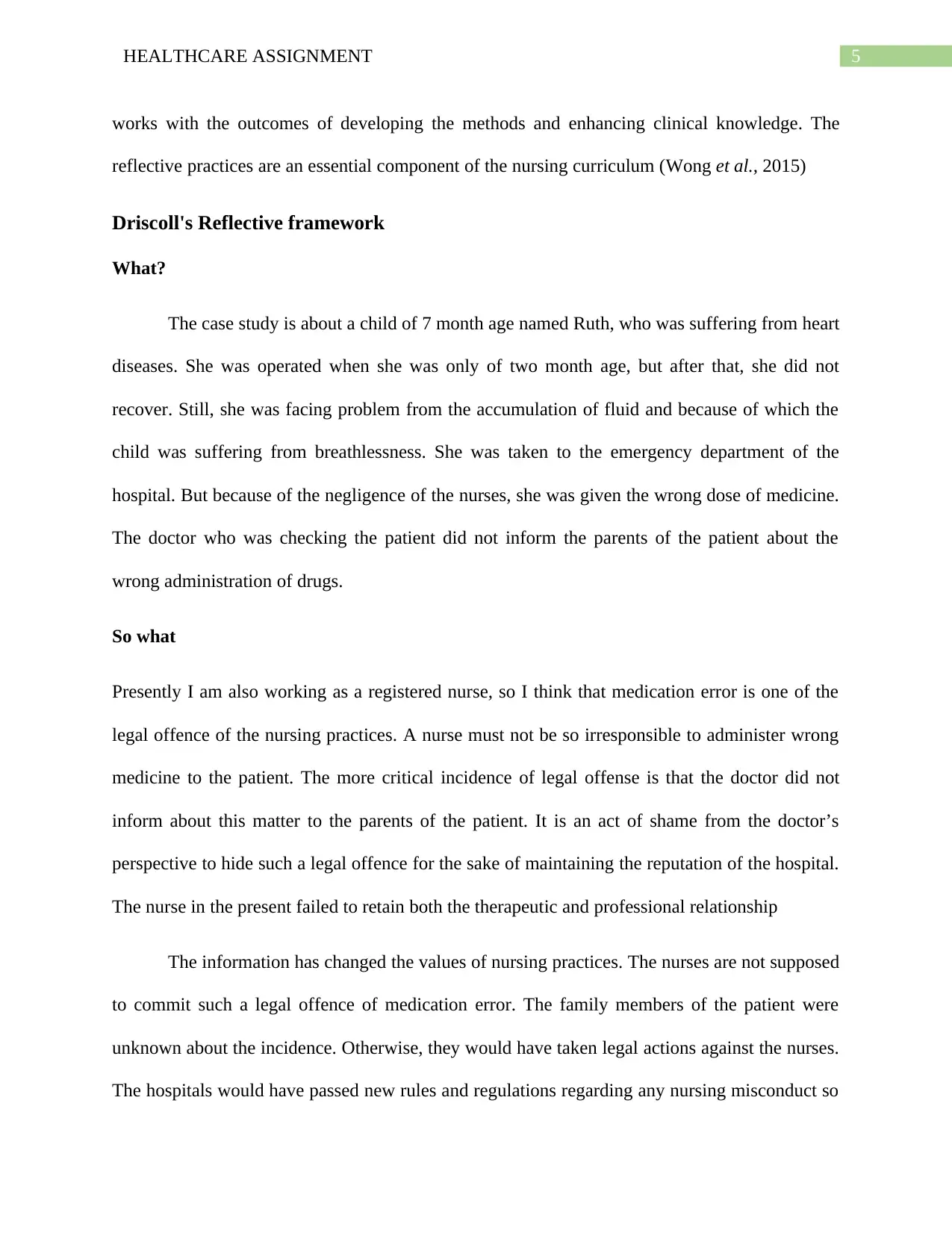
5HEALTHCARE ASSIGNMENT
works with the outcomes of developing the methods and enhancing clinical knowledge. The
reflective practices are an essential component of the nursing curriculum (Wong et al., 2015)
Driscoll's Reflective framework
What?
The case study is about a child of 7 month age named Ruth, who was suffering from heart
diseases. She was operated when she was only of two month age, but after that, she did not
recover. Still, she was facing problem from the accumulation of fluid and because of which the
child was suffering from breathlessness. She was taken to the emergency department of the
hospital. But because of the negligence of the nurses, she was given the wrong dose of medicine.
The doctor who was checking the patient did not inform the parents of the patient about the
wrong administration of drugs.
So what
Presently I am also working as a registered nurse, so I think that medication error is one of the
legal offence of the nursing practices. A nurse must not be so irresponsible to administer wrong
medicine to the patient. The more critical incidence of legal offense is that the doctor did not
inform about this matter to the parents of the patient. It is an act of shame from the doctor’s
perspective to hide such a legal offence for the sake of maintaining the reputation of the hospital.
The nurse in the present failed to retain both the therapeutic and professional relationship
The information has changed the values of nursing practices. The nurses are not supposed
to commit such a legal offence of medication error. The family members of the patient were
unknown about the incidence. Otherwise, they would have taken legal actions against the nurses.
The hospitals would have passed new rules and regulations regarding any nursing misconduct so
works with the outcomes of developing the methods and enhancing clinical knowledge. The
reflective practices are an essential component of the nursing curriculum (Wong et al., 2015)
Driscoll's Reflective framework
What?
The case study is about a child of 7 month age named Ruth, who was suffering from heart
diseases. She was operated when she was only of two month age, but after that, she did not
recover. Still, she was facing problem from the accumulation of fluid and because of which the
child was suffering from breathlessness. She was taken to the emergency department of the
hospital. But because of the negligence of the nurses, she was given the wrong dose of medicine.
The doctor who was checking the patient did not inform the parents of the patient about the
wrong administration of drugs.
So what
Presently I am also working as a registered nurse, so I think that medication error is one of the
legal offence of the nursing practices. A nurse must not be so irresponsible to administer wrong
medicine to the patient. The more critical incidence of legal offense is that the doctor did not
inform about this matter to the parents of the patient. It is an act of shame from the doctor’s
perspective to hide such a legal offence for the sake of maintaining the reputation of the hospital.
The nurse in the present failed to retain both the therapeutic and professional relationship
The information has changed the values of nursing practices. The nurses are not supposed
to commit such a legal offence of medication error. The family members of the patient were
unknown about the incidence. Otherwise, they would have taken legal actions against the nurses.
The hospitals would have passed new rules and regulations regarding any nursing misconduct so
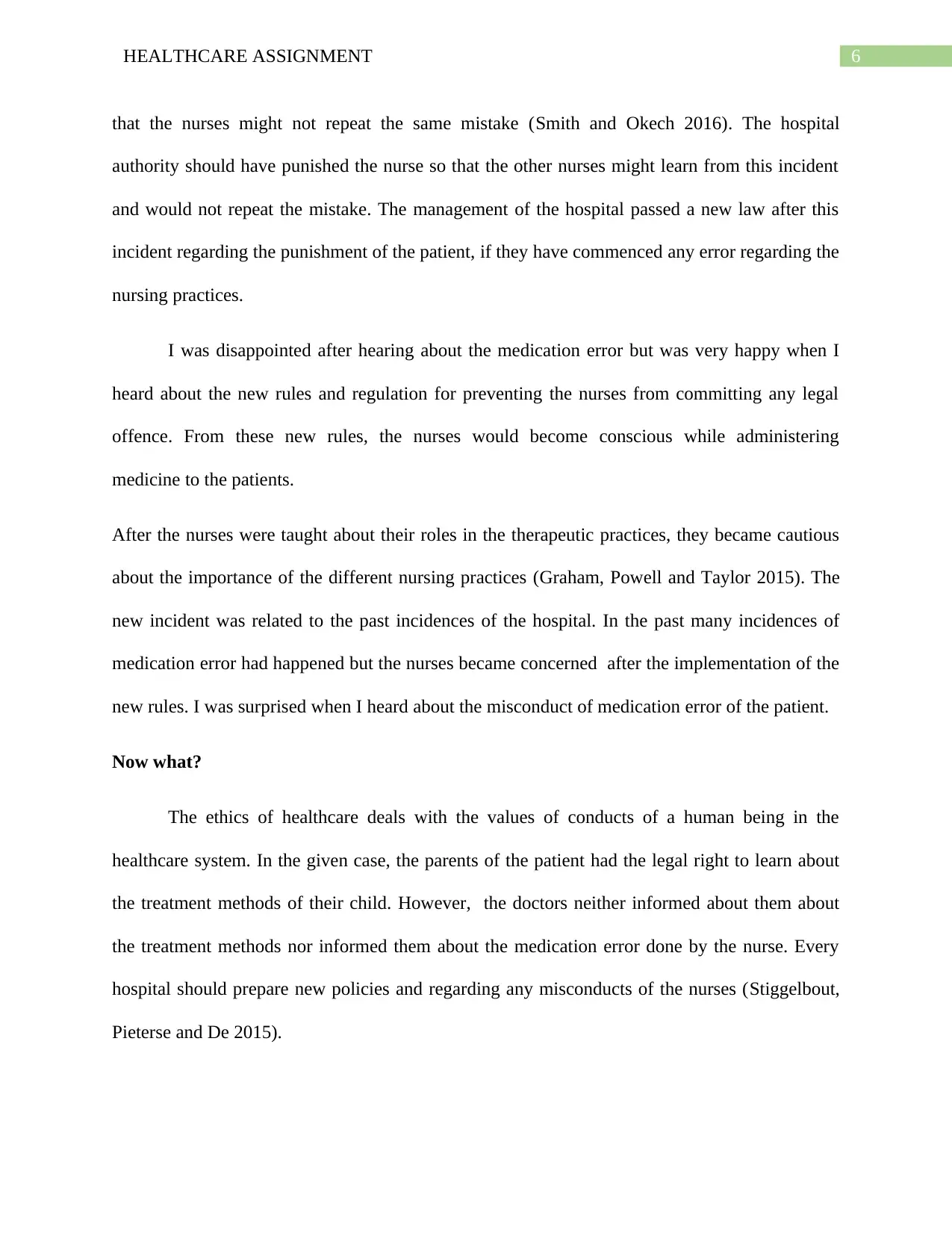
6HEALTHCARE ASSIGNMENT
that the nurses might not repeat the same mistake (Smith and Okech 2016). The hospital
authority should have punished the nurse so that the other nurses might learn from this incident
and would not repeat the mistake. The management of the hospital passed a new law after this
incident regarding the punishment of the patient, if they have commenced any error regarding the
nursing practices.
I was disappointed after hearing about the medication error but was very happy when I
heard about the new rules and regulation for preventing the nurses from committing any legal
offence. From these new rules, the nurses would become conscious while administering
medicine to the patients.
After the nurses were taught about their roles in the therapeutic practices, they became cautious
about the importance of the different nursing practices (Graham, Powell and Taylor 2015). The
new incident was related to the past incidences of the hospital. In the past many incidences of
medication error had happened but the nurses became concerned after the implementation of the
new rules. I was surprised when I heard about the misconduct of medication error of the patient.
Now what?
The ethics of healthcare deals with the values of conducts of a human being in the
healthcare system. In the given case, the parents of the patient had the legal right to learn about
the treatment methods of their child. However, the doctors neither informed about them about
the treatment methods nor informed them about the medication error done by the nurse. Every
hospital should prepare new policies and regarding any misconducts of the nurses (Stiggelbout,
Pieterse and De 2015).
that the nurses might not repeat the same mistake (Smith and Okech 2016). The hospital
authority should have punished the nurse so that the other nurses might learn from this incident
and would not repeat the mistake. The management of the hospital passed a new law after this
incident regarding the punishment of the patient, if they have commenced any error regarding the
nursing practices.
I was disappointed after hearing about the medication error but was very happy when I
heard about the new rules and regulation for preventing the nurses from committing any legal
offence. From these new rules, the nurses would become conscious while administering
medicine to the patients.
After the nurses were taught about their roles in the therapeutic practices, they became cautious
about the importance of the different nursing practices (Graham, Powell and Taylor 2015). The
new incident was related to the past incidences of the hospital. In the past many incidences of
medication error had happened but the nurses became concerned after the implementation of the
new rules. I was surprised when I heard about the misconduct of medication error of the patient.
Now what?
The ethics of healthcare deals with the values of conducts of a human being in the
healthcare system. In the given case, the parents of the patient had the legal right to learn about
the treatment methods of their child. However, the doctors neither informed about them about
the treatment methods nor informed them about the medication error done by the nurse. Every
hospital should prepare new policies and regarding any misconducts of the nurses (Stiggelbout,
Pieterse and De 2015).
⊘ This is a preview!⊘
Do you want full access?
Subscribe today to unlock all pages.

Trusted by 1+ million students worldwide
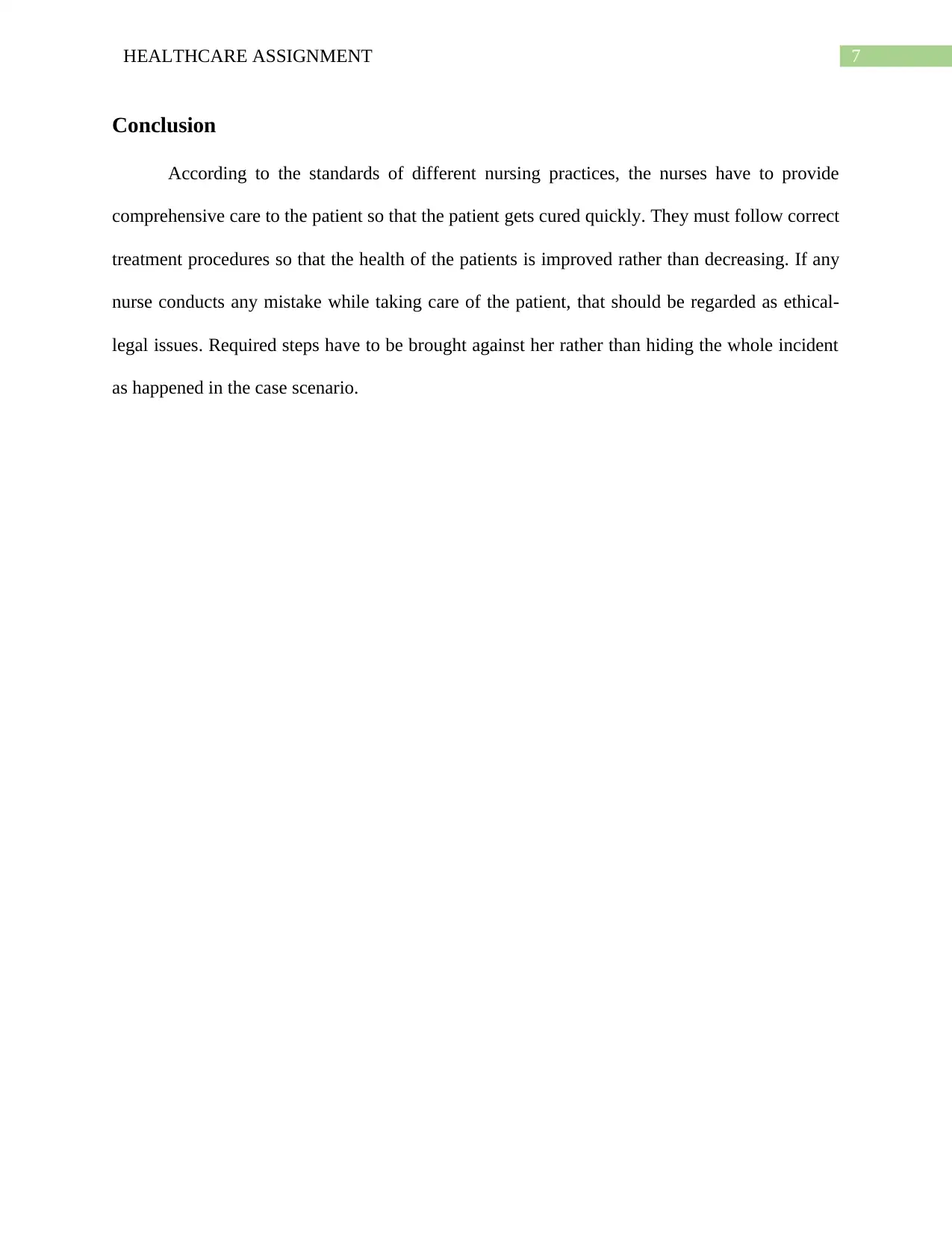
7HEALTHCARE ASSIGNMENT
Conclusion
According to the standards of different nursing practices, the nurses have to provide
comprehensive care to the patient so that the patient gets cured quickly. They must follow correct
treatment procedures so that the health of the patients is improved rather than decreasing. If any
nurse conducts any mistake while taking care of the patient, that should be regarded as ethical-
legal issues. Required steps have to be brought against her rather than hiding the whole incident
as happened in the case scenario.
Conclusion
According to the standards of different nursing practices, the nurses have to provide
comprehensive care to the patient so that the patient gets cured quickly. They must follow correct
treatment procedures so that the health of the patients is improved rather than decreasing. If any
nurse conducts any mistake while taking care of the patient, that should be regarded as ethical-
legal issues. Required steps have to be brought against her rather than hiding the whole incident
as happened in the case scenario.
Paraphrase This Document
Need a fresh take? Get an instant paraphrase of this document with our AI Paraphraser
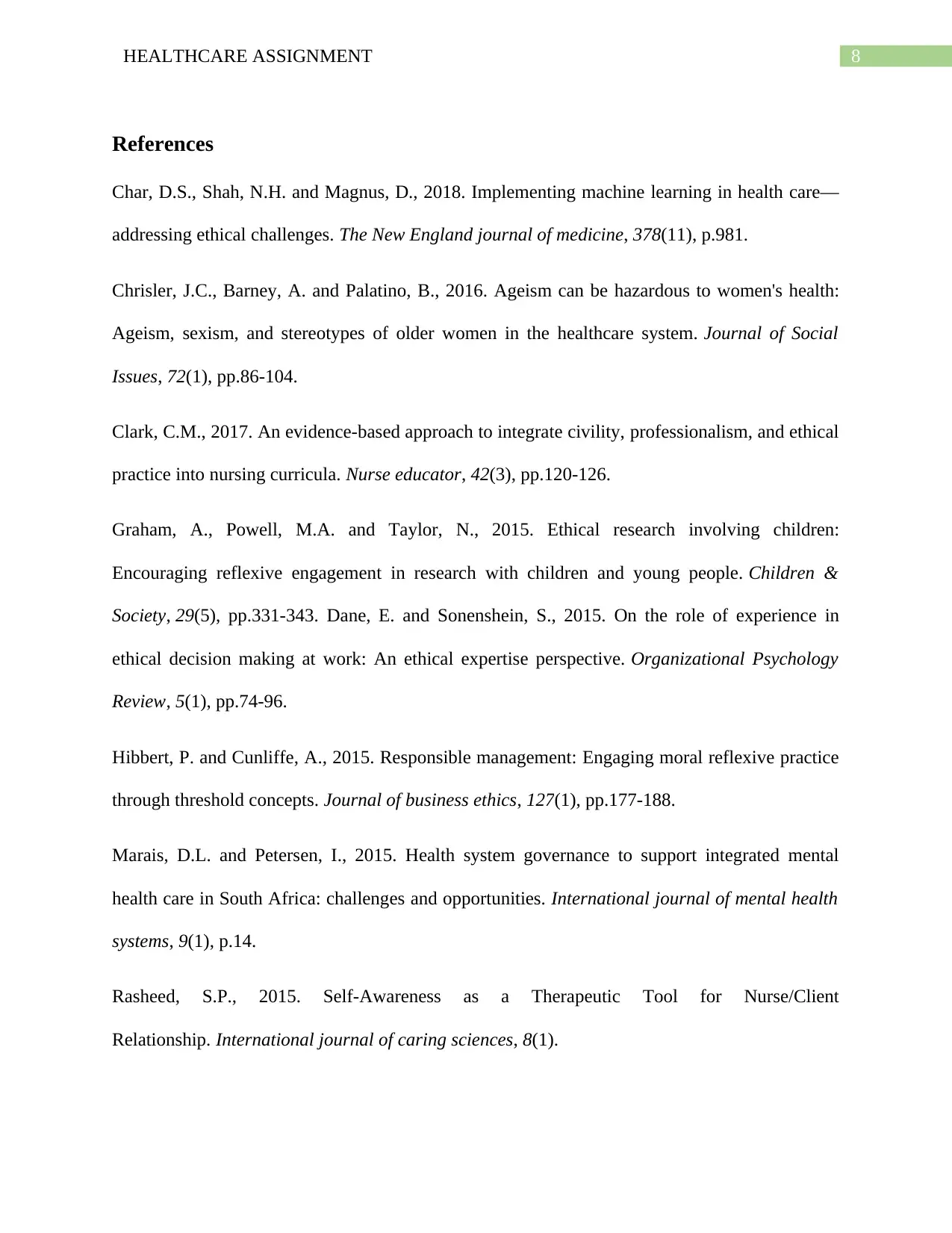
8HEALTHCARE ASSIGNMENT
References
Char, D.S., Shah, N.H. and Magnus, D., 2018. Implementing machine learning in health care—
addressing ethical challenges. The New England journal of medicine, 378(11), p.981.
Chrisler, J.C., Barney, A. and Palatino, B., 2016. Ageism can be hazardous to women's health:
Ageism, sexism, and stereotypes of older women in the healthcare system. Journal of Social
Issues, 72(1), pp.86-104.
Clark, C.M., 2017. An evidence-based approach to integrate civility, professionalism, and ethical
practice into nursing curricula. Nurse educator, 42(3), pp.120-126.
Graham, A., Powell, M.A. and Taylor, N., 2015. Ethical research involving children:
Encouraging reflexive engagement in research with children and young people. Children &
Society, 29(5), pp.331-343. Dane, E. and Sonenshein, S., 2015. On the role of experience in
ethical decision making at work: An ethical expertise perspective. Organizational Psychology
Review, 5(1), pp.74-96.
Hibbert, P. and Cunliffe, A., 2015. Responsible management: Engaging moral reflexive practice
through threshold concepts. Journal of business ethics, 127(1), pp.177-188.
Marais, D.L. and Petersen, I., 2015. Health system governance to support integrated mental
health care in South Africa: challenges and opportunities. International journal of mental health
systems, 9(1), p.14.
Rasheed, S.P., 2015. Self-Awareness as a Therapeutic Tool for Nurse/Client
Relationship. International journal of caring sciences, 8(1).
References
Char, D.S., Shah, N.H. and Magnus, D., 2018. Implementing machine learning in health care—
addressing ethical challenges. The New England journal of medicine, 378(11), p.981.
Chrisler, J.C., Barney, A. and Palatino, B., 2016. Ageism can be hazardous to women's health:
Ageism, sexism, and stereotypes of older women in the healthcare system. Journal of Social
Issues, 72(1), pp.86-104.
Clark, C.M., 2017. An evidence-based approach to integrate civility, professionalism, and ethical
practice into nursing curricula. Nurse educator, 42(3), pp.120-126.
Graham, A., Powell, M.A. and Taylor, N., 2015. Ethical research involving children:
Encouraging reflexive engagement in research with children and young people. Children &
Society, 29(5), pp.331-343. Dane, E. and Sonenshein, S., 2015. On the role of experience in
ethical decision making at work: An ethical expertise perspective. Organizational Psychology
Review, 5(1), pp.74-96.
Hibbert, P. and Cunliffe, A., 2015. Responsible management: Engaging moral reflexive practice
through threshold concepts. Journal of business ethics, 127(1), pp.177-188.
Marais, D.L. and Petersen, I., 2015. Health system governance to support integrated mental
health care in South Africa: challenges and opportunities. International journal of mental health
systems, 9(1), p.14.
Rasheed, S.P., 2015. Self-Awareness as a Therapeutic Tool for Nurse/Client
Relationship. International journal of caring sciences, 8(1).
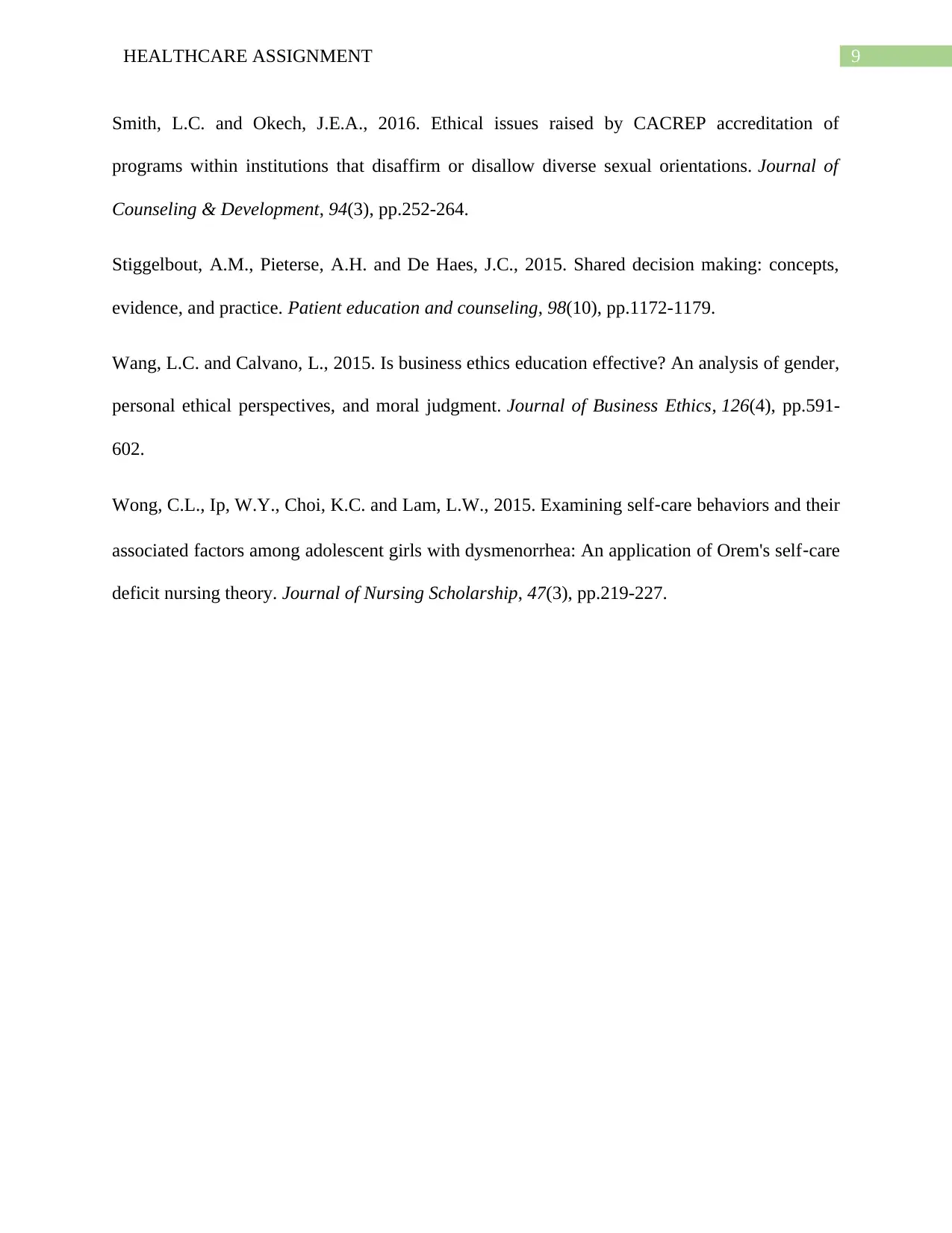
9HEALTHCARE ASSIGNMENT
Smith, L.C. and Okech, J.E.A., 2016. Ethical issues raised by CACREP accreditation of
programs within institutions that disaffirm or disallow diverse sexual orientations. Journal of
Counseling & Development, 94(3), pp.252-264.
Stiggelbout, A.M., Pieterse, A.H. and De Haes, J.C., 2015. Shared decision making: concepts,
evidence, and practice. Patient education and counseling, 98(10), pp.1172-1179.
Wang, L.C. and Calvano, L., 2015. Is business ethics education effective? An analysis of gender,
personal ethical perspectives, and moral judgment. Journal of Business Ethics, 126(4), pp.591-
602.
Wong, C.L., Ip, W.Y., Choi, K.C. and Lam, L.W., 2015. Examining self‐care behaviors and their
associated factors among adolescent girls with dysmenorrhea: An application of Orem's self‐care
deficit nursing theory. Journal of Nursing Scholarship, 47(3), pp.219-227.
Smith, L.C. and Okech, J.E.A., 2016. Ethical issues raised by CACREP accreditation of
programs within institutions that disaffirm or disallow diverse sexual orientations. Journal of
Counseling & Development, 94(3), pp.252-264.
Stiggelbout, A.M., Pieterse, A.H. and De Haes, J.C., 2015. Shared decision making: concepts,
evidence, and practice. Patient education and counseling, 98(10), pp.1172-1179.
Wang, L.C. and Calvano, L., 2015. Is business ethics education effective? An analysis of gender,
personal ethical perspectives, and moral judgment. Journal of Business Ethics, 126(4), pp.591-
602.
Wong, C.L., Ip, W.Y., Choi, K.C. and Lam, L.W., 2015. Examining self‐care behaviors and their
associated factors among adolescent girls with dysmenorrhea: An application of Orem's self‐care
deficit nursing theory. Journal of Nursing Scholarship, 47(3), pp.219-227.
⊘ This is a preview!⊘
Do you want full access?
Subscribe today to unlock all pages.

Trusted by 1+ million students worldwide
1 out of 9
Related Documents
Your All-in-One AI-Powered Toolkit for Academic Success.
+13062052269
info@desklib.com
Available 24*7 on WhatsApp / Email
![[object Object]](/_next/static/media/star-bottom.7253800d.svg)
Unlock your academic potential
Copyright © 2020–2026 A2Z Services. All Rights Reserved. Developed and managed by ZUCOL.




